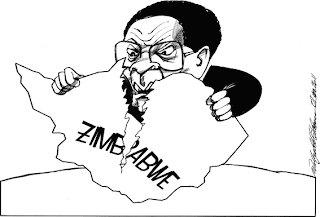Mbeki must change course to save Zimbabwe

The Canberra Times, April 17, 2007
It's enough to make you weep.
Zimbabwe's once thriving economy is on the brink of collapse. Robert Mugabe's post-independence paradise, the erstwhile breadbasket of Southern Africa, is now so dependent on international aid millions would go hungry without it. And still many do.
Even with significant aid, Zimbabwe's life expectancy, about 34 years, is among the lowest in the world. Recent elections have been a farce and people are being brutalised every day by a regime led by an ageing despot determined to cling to power.
It has been that way for years but it took the senseless bashing of opposition members by ZANU-PF thugs to make us really sit up and wrestle with the question: "What can and must be done?"
Australia's John Howard attacked Zimbabwe's leader, calling him a disaster presiding over a "heap of misery".
But Howard, like Tony Blair and George W. Bush, insists South Africa can do more and should pressure Mugabe to go.
"We pussyfoot around far too much using diplomatic language," he said, in the strongest sign yet that Australia thinks South Africa's "quiet diplomacy" has failed.
Zimbabwe's respected neighbour is deeply affected by the crisis. More than two million Zimbabweans facing starvation have poured over its border, most illegally.
So why has South Africa said so little?
Its President, Thabo Mbeki, doubtless believes that everyone would be best served if Mugabe departed the political stage. He has brokered countless deals with him over the years many aimed at encouraging him to exit politics with dignity but Mugabe has always broken the arrangements.
Despite this, Mbeki has said little against Mugabe in public and is reported to have merely told him privately that some people are a little annoyed with him.
The reasons are complex and historical. Mbeki is politically torn between his party's left wing and parliamentary caucus that want action, and others in his party, described as Africanists, who are sympathetic to Mugabe and view Mbeki as a newcomer who should defer to Mugabe as an elder statesman.
Zimbabwe's ties with South Africa run deep. Their guerrilla armies co-operated in their battles for independence.
When members of Zimbabwe's opposition Movement For Democratic Change (MDC) first sought support from South Africa, Mbeki was cautious, opting instead to consult with other African leaders through forums like the African Union.
Turning elsewhere, the MDC approached the South African opposition Democratic Alliance, a predominantly white party. Its leader Tony Leon embraced the MDC leader Morgan Tsvangarai as his "Man in Zim".
But this only served to undermine Tsvangarai's credibility with South Africa's ruling African National Congress (it also offered Mugabe a new excuse to label Tsvangarai a political lackey of the West).
Mbeki has, meanwhile, tried to persuade Tsvangarai that talks for a negotiated settlement and power-sharing arrangement within Zimbabwe should include a blanket amnesty for Mugabe and his cronies, but the MDC leader is adamant they should return the millions reportedly looted from the state.
As a strong opponent of the US-led war in Iraq, South Africa is also deeply sceptical of the whole idea of "regime change".
Some within Mugabe's ruling party are convinced Zimbabwe is next in line for a US-led invasion. As an unapologetic proponent of African solutions for African problems and a staunch anti-imperialist, Mbeki does not want Western nations involved.
As well, Mbeki is reluctant to go it alone and oppose a belligerent African despot because the one and only time he did act against one, back in 1995, his fingers were badly burnt.
The despot was Nigeria's General Sani Abachi, who was planning to execute the activist and playwright Ken Saro Wiwa. South Africa's president at the time, Nelson Mandela, sent his then deputy Thabo Mbeki to persuade Abachi to spare Saro Wiwa's life.
But when Mbeki met Abachi, the general made it clear he was not impressed with newly democratic South Africa cosying up to the West and had Saro Wiwa cruelly executed.
Political observers say Mbeki agonised over the details of his meeting with Abachi, the ANC's first public foray into African politics, and concluded that Saro Wiwa was dead not because quiet diplomacy had failed but because South Africa had been the sole voice of African criticism against Abachi.
So, even when Robert Mugabe was inciting his so-called war veterans to force white farmers and black workers from their properties, Mbeki did not speak out, merely stating his preference for land ownership to be resolved in accordance with the rule of law. Even when Mugabe was bulldozing the homes of his own citizens, forcing more than 250,000 onto the streets, Mbeki, again, was muted in his reaction.
If Mbeki wanted to bring about change in Zimbabwe he easily could. For one thing, most of Zimbabwe's fuel passes through South Africa.
Quiet diplomacy has failed to stop the destruction in Zimbabwe. One can only hope Mbeki admits defeat and changes course.



Comments